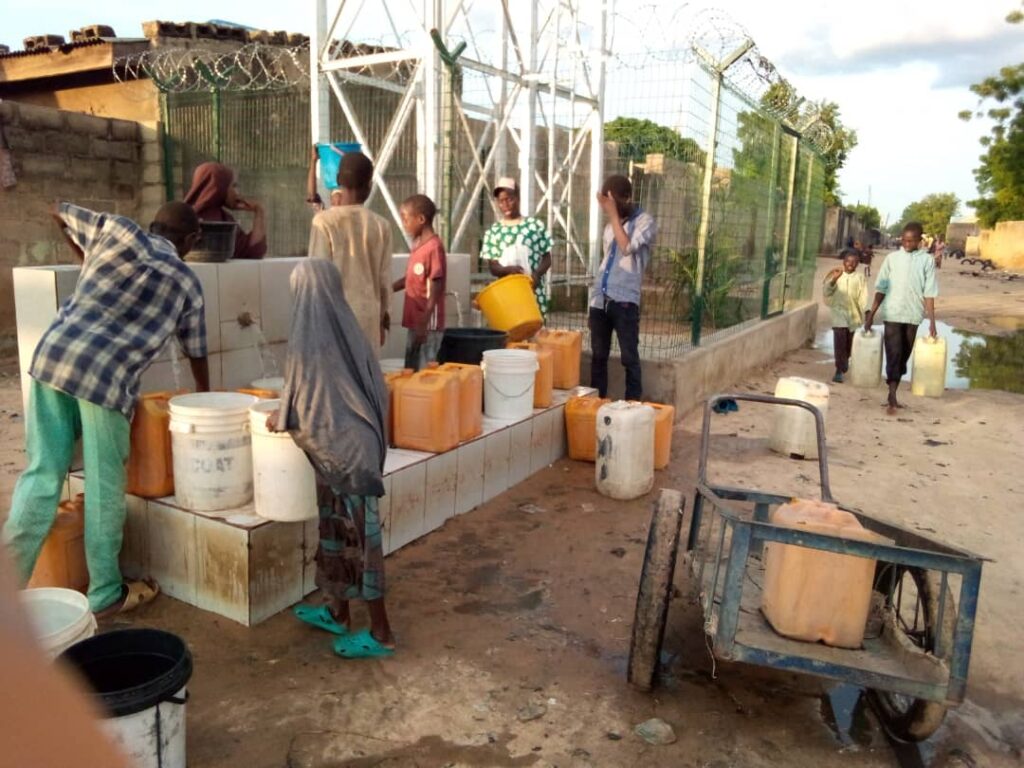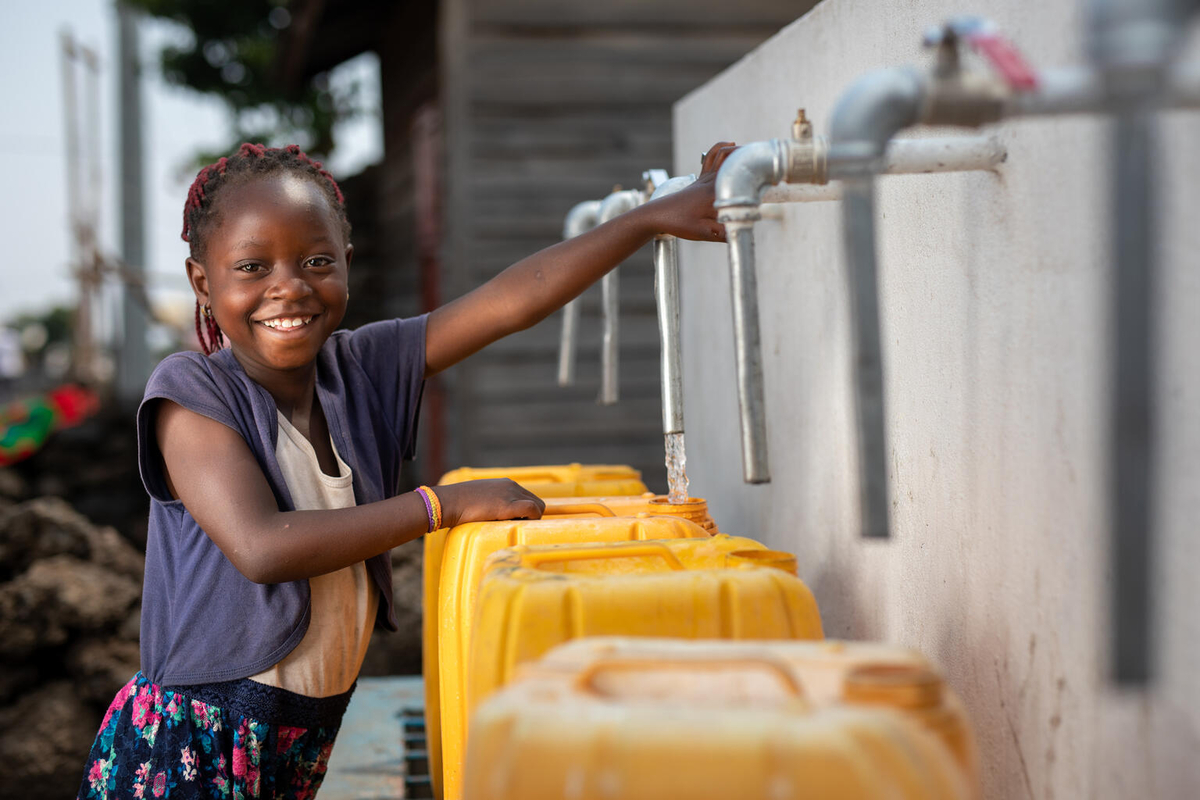It is about 4: PM in the evening and two children run after each other in this dusty streets in Dala Dayeri, a suburb of Maiduguri in Nigeria’s Borno State. In the background, the sound of water hitting buckets can be heard, as women chat while fetching from a solar-powered borehole at the center of the community.
This sight of women gathering water with ease is a new and welcome change. For over 45 years, the people of Dala Dayeri have struggled with access to clean drinking water. Hussaini Zarah, a long-time resident, vividly remembers the challenges of the past. “I still remember how difficult it was to get water,” she recalls. “Managing water while raising children was frustrating. Sometimes my children were late to school because they had to wait in line to fetch water for cooking.”
A hand pump borehole, installed around 15 years ago, was once a glimmer of hope for the community. But the solution was short-lived. The borehole soon broke down, leaving families stranded.
But a community initiated intervention in 2023, led to the installation of the solar powered borehole that now provides constant water supply to the village. “Things are much easier for me and my family now,” said Zarah about the new borehole. “Whenever I go early, I quickly fill my bucket and return home to prepare food for my family,” she said, relieved.

A Long History of Struggles
Access to clean water is a significant challenge in many parts of Nigeria, leading to various health problems. An estimated 70 million Nigerians lack access to safe drinking water, contributing to the spread of waterborne diseases like cholera and diarrhea. These diseases, particularly in children, have a devastating impact on health and mortality rates.
The situation is worse in rural communities like Dala Dayeri with about 39% of households lacking access to essential water supply.
Abu Bulama, the Dala Dayeri community leader had to watch his people suffer with lack of access to water, and the construction of the hand pump borehole brought only temporary hope. “We frequently had to contribute money to repair the borehole,” Bulama explains. “Sometimes, people would wait for days without water, which made life very difficult, especially for families trying to cook, clean, and wash.”
Tired of waiting for the government to act, in 2023, after another long period without access to water, the people of Dala Dayeri decided to take matters into their own hands. Bulama organized a community meeting, bringing together the village elders and concerned residents. They discussed their ongoing water crisis and came to the decision that they needed external help.
“We knew that the situation wasn’t going to get better on its own,” said Hassan Shuaibu , Bulama’s assistant and the person responsible for monitoring the situation in the community. “We drafted a letter and reached out to Save the Children, hoping they could intervene.”
Save the Children, a not-for-profit, established in Nigeria in 2001, is dedicated to improving the lives of children in some of the country’s most challenging environments. The organization responded to Dala Dayeri’s plea and in partnership with the United States Agency for International Development or USAID, installed a solar-powered borehole in early 2024.
The new system has since become the village’s primary water source, significantly easing the pressure on residents.
Ensuring it provides a consistent water supply, a maintenance committee, led by Hassan Shuaibu , oversees the system’s operations, ensuring any technical issues are quickly addressed. They also work with technicians to resolve breakdowns and keep the system in working order.
To keep the water safe, the community cleans the taps and pipes regularly using chlorine, ensuring the water remains uncontaminated. The solar panels that power the borehole are cleaned frequently to maximize sunlight absorption, and the maintenance committee closely monitors the system’s overall performance. This proactive care helps prevent issues that could disrupt the water supply.
Security is another priority. After experiencing theft of tap heads, the community has increased vigilance and is considering adding more security measures, such as guards or fencing, to protect the borehole.
“This borehole has really made a difference for us,” says Shuaibu. “Before, we only had access to water from open wells, but now we can easily fetch clean water.”
Need for more
However, the relief provided by the solar-powered borehole comes with its own set of challenges. On some days, the panels do not charge fully, leading to insufficient water supply for the community. During these times, water is available only twice a day—between 10:00 a.m. and 2:00 p.m., and then again from 4:00 p.m. to 6:00 p.m.
Shuaibu Hassan notes that the population of Dala Dayeri is rapidly increasing. “With the growing number of people relying on it, it’s hard to meet everyone’s needs,” he says. Additionally, residents from neighboring areas, such as Dala Lawanti, also depend on the borehole, further straining the supply. The community has also faced theft of tap heads, prompting calls for enhanced security measures to protect the water system.
However, residents like Zarah and Bulama are grateful for the solar powered borehole. “We are grateful for what we have,” Zarah says, “but we’re praying for more solar-powered boreholes so we don’t have to worry about running out of water again.”
This story was produced with the support of Nigeria Health Watch through the Solutions Journalism Network, a nonprofit organisation dedicated to rigorous and compelling reporting about responses to social problems.
For over 45 years, the residents of Dala Dayeri, a suburb of Maiduguri in Nigeria's Borno State, faced severe challenges accessing clean drinking water, significantly affecting their daily lives. Despite the installation of a hand pump borehole 15 years ago, it eventually broke down, leaving the community without a reliable water source. In response, a community effort in 2023 led to the installation of a solar-powered borehole with assistance from Save the Children and USAID, giving the community continuous access to clean water. This development has had a positive impact on the lives of residents, easing daily pressures, particularly for women and children.
However, the new system still faces challenges. Limited charging of solar panels sometimes results in insufficient water supply, limiting availability to specific hours. Additionally, the growing population in Dala Dayeri and nearby areas further strains the water system. Concerns about theft have led to heightened vigilance and consideration for additional security measures. Despite these issues, residents like Hussaini Zarah and community leader Bulama Abu express gratitude for the borehole and hope for more installations to sustainably alleviate water scarcity issues in the future.






